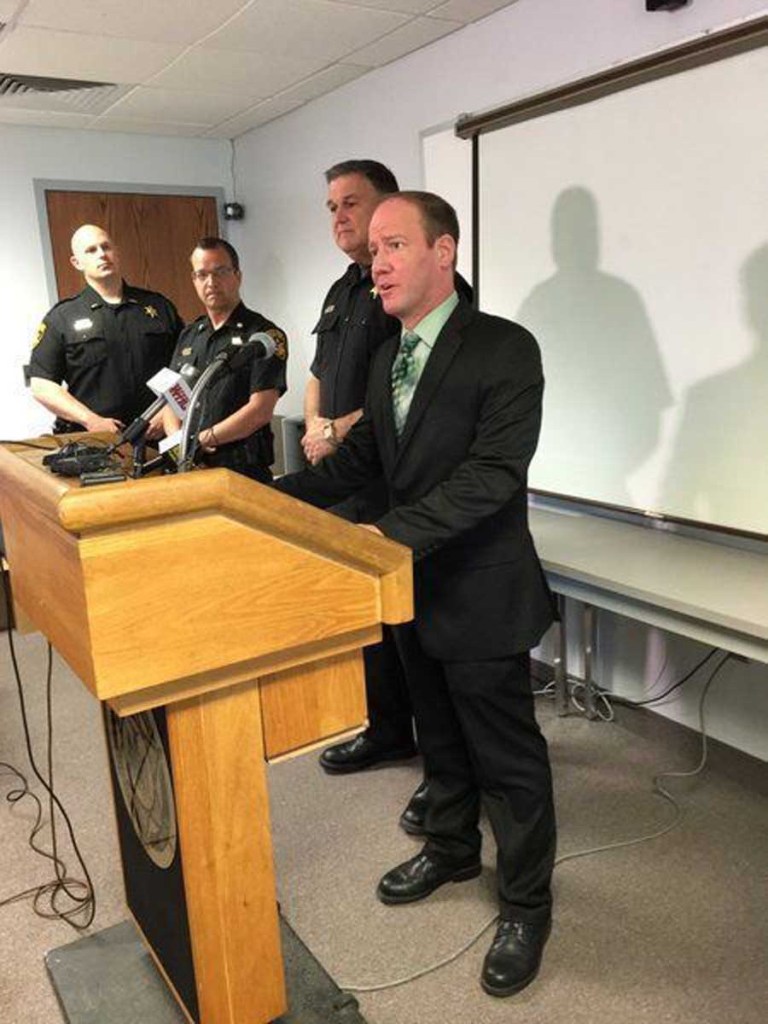NY man overcomes genetic disease, obstacles to return to service
Published 10:52 am Saturday, June 18, 2016

- JOE LOTEMPLIO/STAFF PHOTOAt a press conference Friday, Aaron Heroux talks about a dream come true — thanks to a two-year effort and a law passed by the State Senate and Assembly, he will once again serve as a Clinton County Sheriff's Department deputy. He had given up the job when sidelined by cystic fibrosis and then a double lung transplant and, when he was fit to join the force again, was two years older than the state's minimum age of 35 to be hired as a police officer. A state law, which now awaits the governor's signature, had to be passed to allow an exemption for him.
PLATTSBURGH, N.Y. — After a two-year battle against a debilitating illness and associated challenges, an upstate New York man has won back his ability to serve his community as a member of local law enforcement.
“We heard so many ‘nos’ the past two years (that) to finally hear that one ‘yes’ was such a relief,” Aaron Heroux said at a news conference Friday morning.
“It was amazing.”
FIGHTING A LIFELONG NEMESIS
Heroux’s story is a good one — a story of inspiration, courage, perseverance, hope and accomplishment.
The 11-year deputy had to leave the force two years ago, after his lifelong nemesis, cystic fibrosis, rendered him unable to continue working for the Clinton County, New York Sheriff’s Department.
The genetic disease, which causes a thick mucus buildup in the lungs and other organs, limits breathing and spurns infections in most sufferers.
Heroux tried to hang on as long as he could, often struggling to catch his breath while performing such duties as directing traffic in freezing weather, but it became too much.
“He came to work every day, and you never heard a complaint from him, and that was amazing,” Sheriff David Favro said.
Always active in sports, Heroux said he managed to live with the affliction as best he could, but over time, it became more difficult.
“As you get older, your lung function deteriorates, and you are not able to do things like you once were,” he said.
NEEDED STATE LAW
Heroux had to leave his job when he went to Boston to get a double lung transplant in February of 2014.
The procedure not only saved his life, but also allowed him to get healthy enough to get back to work.
Out on full disability, he could have collected his benefits and taken a job elsewhere.
“I tried picturing myself doing something else, but honestly, this is who I am,” he said. “What I like to do is help people in my community.”
But Heroux, then 37, faced an obstacle in getting his job back. He was two years over the age of 35 — the limit for law enforcement hiring.
To get him back to work, a process was begun that would lead to the State Legislature approving home-rule legislation that would allow the county to hire Heroux back despite his age.
But, as the sheriff explained, going through Civil Service bureaucracy to sidestep the age issue was not easy.
It took about two years to finally get to the point where the state was willing to do something for Heroux.
“When you don’t have a vehicle to get where you want to go, you make one, and we had a great team effort to get this done,” Favro said.
STANDING OVATION
The County Legislature approved a measure last month to allow Heroux to go back to work, and the Assembly and Senate passed bills this week in Albany.
The legislation just awaits the signature of Gov. Andrew Cuomo, which is expected any day now.
Heroux, his wife, Victoria, the sheriff and others joined Assemblywoman Janet Duprey and State Sen. Betty Little in Albany as the bill was unanimously approved to a standing ovation in the government chambers.
“It was amazing,” Heroux said. “We are just glad to put this all behind us and move forward and get on with our lives.”
‘INSPIRATION’
After sorting through some more paperwork, Heroux should be back on the job soon, Favro said, picking up where he left off, serving and protecting his community.
“He certainly has been an inspiration to me in my 35 years of law enforcement and to all of us in the department, and most importantly, to others who have cystic fibrosis so that they know there is hope,” Favro said.
“Usually, when someone is given a free ride, they take it, and he could have gotten another job and probably made more money elsewhere, but he came back because he is a police officer.”
‘JUST WANTS TO WORK’
Heroux was earning about $45,000 a year when he was forced to leave the job. The County Legislature will determine whether he can return at his previous salary or at a lower rate.
“He didn’t even ask about the salary,” Favro said.
“He just wanted to come back to work.”
County Legislator Sam Dyer (D-Area 3, Beekmantown), who chairs the county’s Personnel Committee, said he was honored to hire Heroux back.
“I just can’t say enough about this man,” he said.
“This is a picture-book story. A lot of times people are fighting to get on disability; he was fighting to get off.”
PROMISED WIFE
Duprey, who is retiring at the end of this year, said Heroux’s courage has been remarkable.
“What a proud moment for me that my final introduction and bill in the Assembly are in recognition of Aaron Heroux,” she said. “Instead of sitting home and being paid for doing nothing, he wants to go back to work in a position that he loves and does very well.”
Little said Heroux is an inspiration to all who fight health issues.
“His positive attitude and desire to recover from a bilateral lung transplant in order to return to work as a Clinton County deputy sheriff epitomizes the highest standard of a dedicated public servant,” she said.
Heroux is happy to be back and quite relieved.
“I remember the day well when I had to leave. It was not a good day,” he said.
“But I promised my wife that I would get that lung transplant, I would get healthy, and I would get my job back.
“That was my goal.”
LoTemplio writes for the Plattsburgh, New York Press-Republican.





